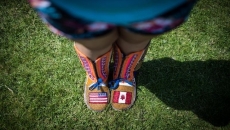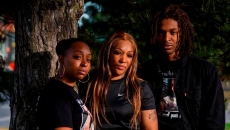A new research project will look at the impact of the COVID-19 pandemic on racialized communities as well as existing biases in the health-care system.
The national project was launched by Roberta Timothy, an assistant professor with the University of Toronto's Institute for Pandemics.
Timothy says many members of the Black and Indigenous communities already avoid interacting with the health-care system mostly due to experiences with racism and biases.
During a global pandemic, Timothy says that can have grave consequences for the well-being of those communities.
"People will seek help when it's an emergency and by then it's too late," she says. "Because of the bias, because of anti-black racism, because of violence they experience, their health becomes more at risk."
Timothy says there's a need for more data to effectively understand the impact of COVID-19 on racialized communities.
The Ontario government refused to collect race-based data earlier in the pandemic, but it was forced to change course in June. Now it mandates the collection of data around race, income, household size and language when following up with people who've been infected with COVID-19.
A spokesman for the Ministry of Health said the government is engaging with people from racialized communities and other health equity experts regarding the data collection.
"We plan to share findings of this data collection, informed by this engagement," David Jensen said in an email.
Jensen said the ministry is concerned about the spread of the virus in "certain groups of people and in certain neighbourhoods," and would welcome additional insights and information about how COVID-19 is affecting racialized communities.
Early data compiled by Toronto Public Health showed that 83 per cent of COVID-19 cases occurred in racialized people. Black people represented 21 per cent of cases in Toronto, but only nine per cent of the city's population.
"There is growing evidence in North America and beyond that racialized people and people living in lower-income households are more likely to be affected by COVID-19," said Dr. Christine Navarro, associate medical officer of health for Toronto.
"While the exact reasons for this have yet to be fully understood, we believe it is related to both poverty and racism."
Timothy's project will collect more data about how Black and Indigenous people interact with the health-care system, but also about economic impacts, evictions, support networks and essential work being done by marginalized communities.
"An underlying part of the project is not only to bring better data, but to support the community in strategizing and finding interventions to find how we get through this," said Timothy.
Rudayna Bahubeshi, a Toronto resident and post-graduate student in public policy, says she has first-hand experience with racism in the health-care system. During a stint in a mood disorder ward when she was 18, Bahubeshi said a nurse mistook her for a 30-year-old patient — the only other Black person in the ward at the time — and tried to make her take the other person's medication.
Bahubeshi says she argued but was ignored, and believes her race was a factor in the way she was treated by staff. She says the nurse only realized the mistake when the other patient happened to walk by.
In another hospital visit during the pandemic, Bahubeshi says she was taken to a "COVID ward" because she had fever. She says staff would not answer simple questions about whether there were risks involved with using a shared washroom, or about the fact that some staff weren't wearing PPE.
"The way she (the nurse) was engaging with me was very much that I was the problem," says Bahubeshi. "When I talked to a doctor afterwards they told me I was fully in the right and that was unacceptable."
Bahubeshi says experiences like those erode her trust in the public health system and its ability to provide quality care for her. She says more data about the experience of Black people in health care will be a first step in the right direction.
"The fact that we don't have race-based data is a way we've decided that Black communities are not a priority," said Bahubeshi.
Timothy's national project is set to begin in a few months, and will involve surveys and focus groups among Black and Indigenous Canadians.
Photo courtesy of Istock




.jpg)

